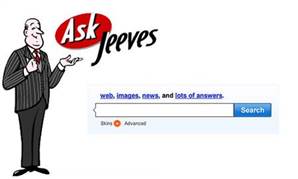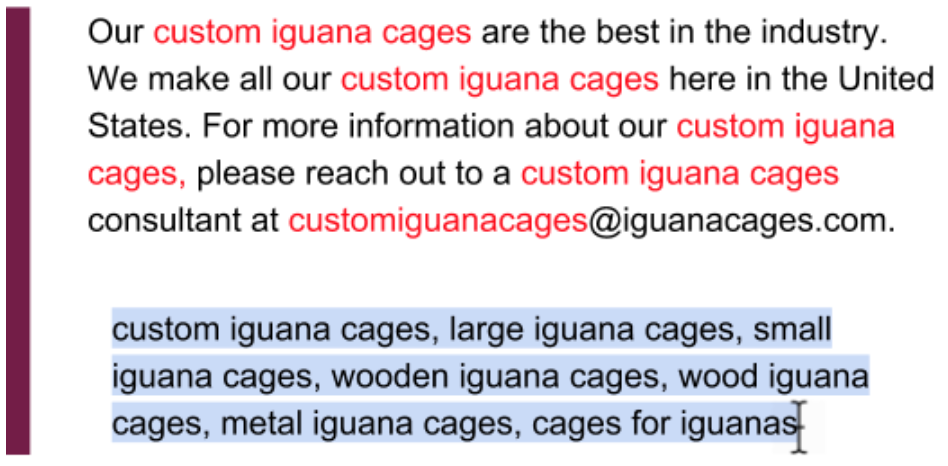A guide to backlinks and why they’re important for SEO and organic traffic growth
This guide is for people who want to know why links (aka backlinks) are
I’ll start with a brief history of search engines because I think it adds important context, but free to skip ahead to any section you’d like to learn more about:
- The History of Search Engines
- Authority
- Relevance
- Referral Traffic
- Brand Awareness
- Other Link Value Metrics
- Conclusion
The History of Search Engines
Search engines used to suck. Anyone who was around in the 90s or early 00s likely remembers using some of the earlier search platforms: Lycos, Excite, AskJeeves, Altavista, and the rest. You’d type something in, then scroll through pages and pages of results, often not finding anything useful at all.

They were so bad there was even a search engine called Dogpile which searched all the other search engines for you. It spat out the combined results, the quality of which were comparable to what comes out of an actual dog.
Those early web search platforms didn’t work that well because they had an unsophisticated approach to ranking. Essentially, the way they worked was:
- Crawl all the websites we can find and make an index of the web (so far so good)
- When someone searches for something, look in the index for pages that contain that search term
- Rank those pages by the number of times the search term appears on each page
- Display the results
Website operators and marketers (crafty types that we are) got wind of this and started to game the system by jamming our pages full of search terms (aka keywords). As a result, you’d see keywords just blatantly repeated on a page, like this:

But marketers were thirsty for traffic, so sometimes to really juice up their sites, they would even add keywords in the same color as the site background.
That way, they could fit more keywords in and trick the search engines into thinking their page was really about that keyword. You could often see the text if you highlighted it with your cursor:

This tactic is called keyword stuffing. Smart SEO people don’t use it anymore, but it used to be common. And, it helped a lot of untrustworthy websites rank highly in search.
It got so bad that you’d often see search results that made no sense at all. You’d search for something totally benign like “new york times” and end up with a bunch of web pages that were selling herbal Viagra or something like that.
And this was just the start of it. I won’t go into it all right now, but there are all types of hacks, tricks, and bullshit tactics that people used to try and get more traffic from search engines.
It was a real mess.
Enter Google.
The reason Google gained a monopoly in search is simple: they had the best search results. And they did it by coming up with a complicated formula to figure out which websites were trustworthy. The formula was an algorithm called PageRank, and it was what allowed Google to use backlinks as a ranking factor.
Here’s a simplified description of the new process Google came up with:
- Crawl all the websites we can find and make an index of the web
- When someone Googles something, look in the index for pages that contain that search term
- Rank those pages by how often the search term appears on each page (so far, it’s the same as the other search engines)
- Take into account the number of other websites which link to each of those pages (as well as the number of links the linking pages have)
- Display the results
This new 4th step was really smart. It produced search results that were much better. The reason it worked was Google realized that links were a proxy for trust.
Their theory was that the human beings who make websites would only link to other websites if they trusted the website they were linking to. Therefore, it was reasonable to think that sites with more links to them should be seen as more trustworthy.
It wasn’t just about pure numbers of links, either. Google tweaked their calculations so that some links were more valuable than others. Essentially, links from websites with more links to them were counted more heavily in the calculations.
They started using this trustworthiness as a ranking factor to improve their search results. And it worked so well that just a few years after they launched, there was only one search engine that mattered: Google.
Backrub was a bad, creepy name and everyone is glad they changed it. But it’s a cool story to illustrate how important backlinks were (and still are) to Google rankings.
Nowadays, improving the authority of your website by earning valuable links is a really big deal in organic search. And it’s gotten way more complex than that original PageRank algorithm.
We’ll go into a little more detail in this article. But if you’re interested in using backlinks to get your website seen by more people searching on Google, the main takeaways are:
- Getting links to your site/content is important. Links are a way
of telling Google that your site is trustworthy. - The quality of the links matters (a lot).
To understand more about what makes links “high-quality”, we need to dig in a little deeper and understand the main things that determine link value. Mainly, we’re talking about authority and relevance, but there are some other factors we’ll discuss too.
If an SEO person tells you they know how Google works, they are lying. Nobody knows how Google search works in its entirety. Not even Google. Everything we know is based on the limited information we get from Google, patents that Google has filed, our own experience working in SEO, and experiments that SEO practitioners have carried out.
That said, the methods I’m describing here are generally accepted in the SEO industry. As long as you use common sense and don’t take them too far by hyper-focusing on any one metric, you should get some good results for your business.
Authority
Let’s pretend you run a food blog. If your blog posts showed up higher in Google search results, they would reach a lot more people. That would get you more readers, and allow you to sell more of your cooking classes or ad impressions or cookbooks or whatever your business model is.
You’ve learned that getting backlinks to your site will help your blog rank higher in search, so you’ve decided to try and invest some time and money into link acquisition.
Knowing that Google places more value on some links than others, you will need some way to figure out the quality of links before you start trying to acquire them.
Measuring the Authority of a Domain
The thing about links is they don’t have that much value by themselves. Links get their value from the web page they are on. For example, a link to your food blog from a page on nytimes.com is going to be much more valuable than a link from iguanacages.com.
Why? Because the New York Times has a lot of authority. It gets that authority from the fact that it’s frequently cited (linked to) from other websites.
There are other factors that go into authority, but this “link equity” is probably still the most important.
Some examples of domain names are:
- tomdehnel.com (you are here)
- google.com
- wikipedia.org
- iguanacages.com
Domain Authority (DA) is a score created by Moz, ranging from 0 to 100, that predicts how well a domain will rank on Google.
I should mention: it’s an imperfect metric. In fact, there are many SEOs who say you shouldn’t use it at all to value links (more on this later). But it’s still probably the most popular way to talk about the linking value of a website. And it’s a good way for beginners to get their heads around valuing links.
Example Domain Authority (DA) Scores
| Website domain | DA Score (Feb 2019) |
| nytimes.com | 95 |
| guyfieri.com | 45 |
| iguanacages.com | 2 |
Moz calculates DA scores based on a variety of factors. You can read more about how they do it on their website. But at a high level, they’re mainly analyzing links to/from different websites, along with some other factors which we don’t need to go into right now.
One thing that’s important to understand is the Moz DA score is not used by Google. In fact, Google says they don’t even have an individual scoring system for domains. Instead, they rank search results using hundreds of different factors. But it’s safe to say that links are a major factor in Domain Authority.
You can find the DA for any website by installing the Moz toolbar and visiting the site you’re interested in. You’ll need a (free) Moz account to use it, but it’s helpful for anyone learning how to think about the link value of different domains.
This is one of the most important points in SEO. Google doesn’t want people to focus too much on SEO. Instead, they’d prefer that people make websites with quality content that users will enjoy. Over-optimizing your site with spammy/paid link building, keyword stuffing, or anything else is likely to get you penalized.
Not to say you won’t find plenty of SEO consultants who use these tricks. Sometimes, they actually work in the short term. But what usually happens is Google catches on to the hack, and then it goes from helping you, to hurting you. Common sense tells us it’s better to focus on building an asset that will stick around for the long term. That means doing things the right way, and not focusing too much on trying to juice up any one particular metric.
Page Authority
Just like domains can have their own authority, so can pages on those domains. And not every page on a domain has the same level of authority.
Why not? Because some pages are more important than others. Think about it like a newspaper. The front page is where the most important stories go. A story that’s buried deep in
In a similar way, low-traffic web pages on low-visibility areas of a website are likely to have much less page authority. That doesn’t mean links on those pages aren’t valuable, they’re probably just less valuable.
A quick note before we move on: There are many ways to rate the value of links. These include Trust Flow/Citation Flow from Majestic, Ahrefs Domain Rating and Page Rating, and the SEMrush Trust Score.
A Quick Recap on Authority:
- It’s good to have links from high-authority websites.
- You can measure the quality of a link by looking at the Domain Authority of the linking website.
- Moz DA is the industry standard way to measure authority.
- For a more accurate picture, you should also look at the authority of the individual page that the link is on.
Relevance
Another way to think about the value of a particular link is by evaluating the relevance of the linking page. Relevance doesn’t come with a nice 0-100 number like Domain Authority does, but it’s easy to figure out with a little common sense.
I like to think about relevance like celebrity endorsements. Let’s go back to your pretend food blog example…
Things are going well at the food blog. You’re posting lots of recipes, restaurant reviews, and interviews with some local chefs. Your readers are passionately commenting on your posts. And some restaurants are even reaching out to you and asking if you’ll come by and review their food.
Now imagine you learn that your food blog has been endorsed by none other than Justin Trudeau, the Prime Minister of Canada.

Trudeau seems like a good guy. He’s certainly popular and well-known. So it’s fair to say that his endorsement would help more people to trust your food blog. We can think of Trudeau’s endorsement as a high-authority endorsement.
It would be similar to your food blog earning a link from a popular, high-authority website. Say for example, the Huffington Post (DA 94).
But as well-rounded as he is, Trudeau is not known for being a food expert. In fact, he pretty much outed himself as a culinary impostor by claiming his favorite food type is “Asian” (which is obviously ridiculous because Asia is an entire continent with many cuisines.)
So we can think of Trudeau’s endorsement as high in authority, but low in relevance. In other words, he doesn’t seem to know much about food.
Now imagine your food blog gets an endorsement from celebrity chef Gordon Ramsay. Ramsay is a food man through and through. If you haven’t made his scrambled eggs recipe yet you’re missing out on one of the simple pleasures of life.

An endorsement from Ramsay to your food blog would be super valuable because Ramsay clearly knows food. This is a great example of a relevant endorsement.
This would be similar to your food blog earning a link from a topically-relevant cooking or food website, like the American Culinary Federation (DA 56).
Lots of SEO practitioners have good reason to think Google values links in this way. And although Google won’t confirm it, I’ve gotta go with the crowd on this one.
Relevant links can help drive traffic from qualified buyers (more on this later), but I think the best reason to try and get relevant links has more to do with SEO.
We know there are publicly available computer programs which can read a website and understand its topic/subject matter. I won’t go into too much detail, but they use a combination of Machine Learning and Natural Language Processing (NLP).
I think it’s very safe to assume that Google, one of the largest technology companies the world has ever seen, is using this stuff.
So, let’s assume that getting relevant links is a good thing. Think of them like endorsements in the form of a link from groups or websites similar to yours. And those links can help you telegraph to Google that you’re authoritative in your industry.
A good way to determine linking page relevance is to use Topical Trust Flow (part of the Majestic suite of tools). They use a computer program to “read” web pages and make a guess about the topic of those pages. Like all tools, you shouldn’t trust it blindly. But if you’re interpreting the data properly, it can help you find content similar to your own. And that can help you prioritize which domains or pages you should be getting links from.
A Quick Recap on Page Relevance
- Google almost definitely has the ability to give extra weight to links from related web pages
- If you get links from pages which are topically similar to your site, it will almost certainly help your site rank better
- Examples are: links from industry trade groups, related publications and blogs, or other businesses related to yours
Referral Traffic
Referral traffic was the original intent of backlinks. Website operators would add a link on their site to another site they liked, with the goal of sending traffic to that other website. This had nothing to do with search engines at all, just one bro doing another bro a solid.
When there’s a link to your website from another page, visitors to that other page might click that link and visit your website. Congratulations, you just got yourself a new visitor, who might return and become a regular reader, user, or customer of your website.
Many SEO people also believe that page traffic is another way of figuring out how much authority an individual page has. I think this makes a lot of sense, so if you want, you can factor that into your value rankings too.
In my opinion, the benefit of the actual referral traffic (direct visitors to
- A placement in a gift guide or news story can drive a short-term spike in sales
- An endorsement from a popular blog or publication in your industry can provide a steady stream of referral traffic
Brand Awareness
This benefit is the simplest of all.
If you can get your brand name out there in the form of links on other websites, more people will become aware of your website or brand, even if they don’t click on the link. That will make them more likely (over time) to buy your products.
Remember, Google doesn’t just follow links. It can “read” webpages. So not only can people read your brand name written somewhere else and become aware of it. But so can Google.
If Google sees your brand name coming up a lot on other web pages, they may take that to mean that your brand is trustworthy or authoritative, and it could give your site a nice SEO boost.
Other Link Value Metrics
Based on the fine work of other SEO practitioners (particularly Bill Sklawski), we know that there are several other factors that Google probably uses to evaluate the value of a particular link.
One word of caution. Many website owners end up hyper-focusing on these metrics and it hurts them. Remember, Google likes for things to look natural. If you start trying to mess with these metrics, do so at your own risk. If you create a situation that looks like link manipulation, you are risking a potential penalty.
Anchor text
Anchor text is the words that are on the link itself. For example:

By “reading” this text, Google can make an educated guess at what the website it links to is about. That might help it rank better for searches related to that text.
Anchor text annotation
This one is super interesting. Google has filed a patent which indicates they may be taking into account the words around the link itself. Essentially, they can take unlinked text into consideration. For example:

In this case, Google might make an educated guess that the linked site has not only iguana cages but also accessories.
Link position on the page
Put simply, the higher up a link is in the main page content, the more likely it is to be valuable. Links that are in the main page content seem to be more valuable than those in headers, footers, and links on images.
Number of links on the page
Having multiple links from a single page does not seem to help much. Some SEO people even think that the number of links on a page “dilutes” the value of all links on that page. This is likely outdated, as some link positions and anchor text/text annotations will likely change the equation.
A Final Word
Links are important for anyone hoping to get more visitors and customers through organic search. Hopefully, you’ve learned the basics and you’re ready to go out and try to build some links on your own.
Just keep one thing in mind. The fine people at Google understand that people are constantly going to be trying to game their system to get websites to rank higher. That’s why I recommend building links in a responsible way. You shouldn’t waste time with spammy, short term tricks. And you should definitely not buy links. Instead, you have to come up with creative ways to earn them.
But that’s a topic for another article.
Did you enjoy this? Follow me on Twitter to get updates when new articles come out. Follow @tomdehnel

I run a small SEO consulting business in San Francisco, CA. I like to write a little bit and get in arguments with my friends. It’s the only way I can make sense of the world.

Hello there! Quick question that’s entirely off
topic. Do you know how to make your site mobile friendly? My weblog looks weird
when viewing from my iphone4. I’m trying to find a theme or plugin that might
be able to resolve this issue. If you have any recommendations, please share.
Cheers!
Hi Leanne – I’ve had the same problem with themes in the past. They all claim to be “mobile friendly” but often there are issues. The fact that your phone has a very small screen complicates things even further. My only suggestion would be to try different themes to see if something else works better. I’d guess that more minimalistic themes would work best for you. Good luck!